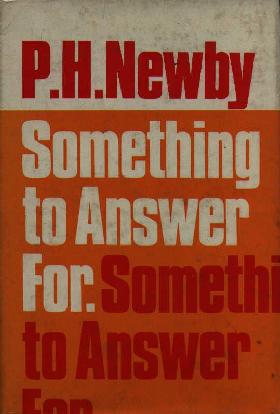
P.H. Newby
The following novels constitute the shortlist for the 1969 Booker Prize:
Notable Omissions from the 1969 Shortlist

|
Something To Answer For P.H. Newby |
Dustjacket Synopsis:
"It was 1956 and he was in Port Said. About these two facts he was reasonably certain but a murderous attack left him
certain about little else – maybe just the conviction that the British usually did the right thing and that to be a crook
a man must assume the society he lived in was honest.
"He had been summoned to Egypt by the widow of an old friend, Elie Khoury, who had been found dead in the street. Murdered? Nobody but the widow seemed to think so. Confusingly, Townrow had a half-memory of Elie’s body being buried at sea. And what about Leah Strauss? Evidently he was having an affair with her, but there were times when he wondered whether he would turn out to be her American husband. If he was her American husband why did his memories appear to be Irish? And only an Englishman, surely, would take it for granted that the British behaved themselves. The arrival of the British paratroops was the final perplexity.
"For already, the weird disorientation of his world had been forcing Townrow towards a re-examination of the basic rules by which he had been living; and into a realization that he too had something personally to answer for.
"Brilliantly constructed, highly intelligent, superbly entertaining, Something to Answer For is Mr Newby’s finest achievement yet."
First Paragraph
The old girl kept writing and complaining about the police. It was enough to start Townrow on a sequence of dreams. Night after night he floated in the sunset-flushed, marine city. He could smell the salt and the jasmine. He dreamed that Mrs Khoury, Mr Khoury and he were all sailing out of the harbour in a boat that slowly filled with water. He dreamed he was in a hot, dark room with a lot of men who argued and shouted. It must have been in the Greek Sailing Club because when a door opened there were oars and polished skiffs; and opposite, high over Simon Artz’s, on the other side of the Canal, was Johnnie Walker with his cane and top hat setting off for Suez. Or was it the Med.?
From the Faber and Faber hardback edition, 1968.
Notes:
This book is currently out of print and very, very difficult to find. All the above information, including the scan of the
book cover, was supplied by Lisa Hill, who was lucky enough to procure a copy, and kind enough to send the details to me.
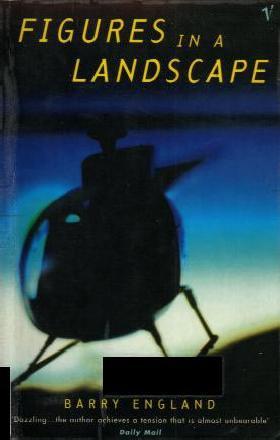
|
Figures in a Landscape Barry England |
Dustjacket synopsis:
"Two men move desperately through an alien territory. They are soldiers, escaped from a column of prisoners of war. They
have one captured gun and pitifully little ammunition. Their most important resource is their instinct for survival,
honed to a ruthless cutting edge by their military training. Safety lies four hundred miles away, across a nightmare country
of hostile natives, heat, insects, storms, treacherous ravines and mountains. And, all the while, an enemy helicopter hovers
over the two figures in a landscape, a technological nemesis directing their implacable pursuers nearer and nearer..."
Quotes:
"MacConnachie and Ansell are men without pasts. As their hopes for a future gradually begin to fade, their present
assumes an almost ritualistic meaning. This growing sense of the importance of each step is conveyed with a power and
intensity that keep the story shocked through with dramatic tension" - Irish Times
"Outstanding...I doubt if there has been a more impressive debut since William Golding's" - Daily Telegraph
First Paragraph:
With their hands tied as usual behind their backs, they had just been paraded through the streets of a small village for the edification of the local population. While they were being formed up for the march to that night's camp, MacConnachie had come suddenly close and whispered harshly:
'If I go left, will you come?'
Ansell, remembering a hundred humiliations at MacConnachie's hands, had stared at him in astonishment.
'What?'
'Will you come?'
'Yes.'
'When I move - follow!'
That was the extent of their planning. They had been beaten for talking.
Stumbling along in the fierce heat, Ansell struggled to make his brain think clearly: what have I committed myself to? what have I done? His bound arms ached at his back, his anguish of mind feeding on his torment of body. Through glazed eyes he saw MacConnachie look back towards him, and his stomach contracted with fear at the thought of what lay ahead. Not an hour before he had committed himself to a man he feared because that man despised him.
From the Vintage paperback edition, 1997.
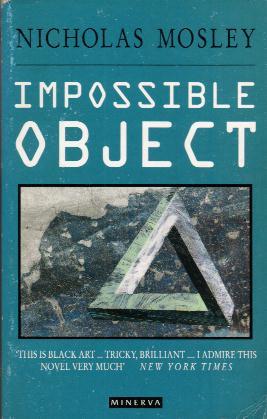
|
Impossible Object Nicholas Mosley |
Dustjacket synopsis:
"Through the lives of a couple observed by different narrators, the eight artfully interconnected stories of
Impossible Object explore the notion, exemplified by the controlling symbol of 'the triangle that can exist in two
dimensions but not in three', that life can never be realised, except in recognition of the impossibility of attaining
it. Nicholas Mosley's provocative theme is as original as it is utterly compelling."
Quotes:
"This is blackart...tricky, brilliant...I admire this novel very much" - New York Times
"Mosley is one of the most interesting and gifted English novelists writing today" - New Statesman
"Nicholas Mosley's very special talent is for describing the sensations experienced within a cocoon of dismay and
terror" - Sunday Times>br>
"Nicholas Mosley must be one of the most compelling writers in the English language today" - Joyce Carol Oates
First Paragraph:
You know how love flourishes in time of war, women standing on station platforms and waiting for the lines of faces to pull out, men's heads three deep in the carriage windows and arms raised like the front legs of horses on the Parthenon. The men do not want to go to war; they look forward to travel and the warmth of soldiers. The women have hankerchiefs round their heads and are tired at so much weeping; they will run to the arms of American airmen and war profiteers, will be carried to armament factories and farms for the breeding of white feathers. The men will sing sad songs round firelight; move across plains in heavy armour jerking and screaming like crusaders.
Now there is no war. The train stops and the faces fall on top of each other like snow; the women are left with their outstretched arms and pots of honey. You get out on the station platform and are again in the world of paper and thin concrete; go along to the waiting room where there are bodies like newspapers wrapped on trolleys. You put a coin in the slot and pull out cardboard. Mummies are crenellated so they will look beautiful in a million years.
From the Minerva paperback edition.
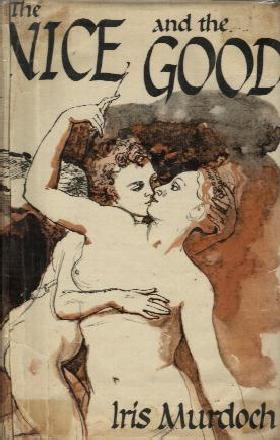
|
The Nice and the Good Iris Murdoch |
Dustjacket synopsis:
"Iris Murdoch's eleventh novel - her longest and most richly peopled - is a domestic comedy revolving round a happily
married couple, Kate and Octavian, and the friends of all ages attached to their household in Dorset. The novel deals with
love in its two aspects, the self-gratifying and the impersonal - the nice and the good - as they are embodied in a
fascinating array of paired characters (including a delightful set of twins, aged nine, given to rock culture and to
seeing flying saucers). The setting of the Dorset countryside, with its ideal roundnesses over which the lovers disport
themselves in a summer of perpetual sunshine, has its counterpart in Octavian's government office in London, where a
violent death involving blackmail and suspected espionage takes place; and the scene in a disused crypt under Whitehall,
where the Black Arts have been practiced, is matched with the climatic episode in a cave by the sea, in which three of
the characters, two human and one canine, have been trapped by the tide. The novel leads through stress and terror to a
joyous and compassionate Midsummer Night's Dream conclusion, in which the couples all sort themselves out neatly
and omnia vincit amor."
First Paragraph:
A head of department, working quietly in his room in Whitehall on a summer afternoon, is not accustomed to being disturbed by the nearby and indubitable sound of a revolver shot.
At one moment a lazy fat man, a perfect sphere his loving wife called him, his name Octavian Gray, was slowly writing a witty sentence in a neat tiny hand upon creamy official paper while he inhaled from his breath the pleasant sleepy smell of an excellent lunch-time burgundy. Then came the shot.
Octavian sat up, stood up. The shot had been somewhere not far away from him in the building. There was no mistaking that sound. Octavian knew the sound well though it was many years since, as a soldier, he had last heard it. His body knew it as he stood there rigid with memory and with the sense, now so unfamiliar to him, of confronting the demands of the awful, of the utterly new.
From the Chatto & Windus hardback edition, 1968.
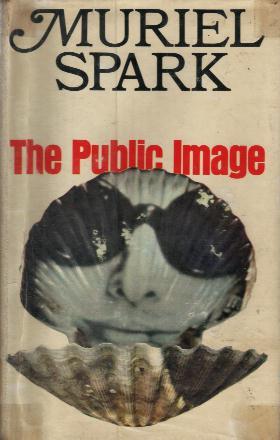
|
The Public Image Muriel Spark |
Dustjacket synopsis:
"'An ethical shocker' is the summing-up of this dazzling book by its dazzingly talented author. Annabel, one of
Muriel Spark's least equivocal and most enchanting heroines, is a film star whose public image is vulnerable. Whose is
not? Murial Spark's unique view of human values is brilliantly illuminated by the contrasting aspects of its setting
- among the ruthless flux of celebrity and fringe life in Italy 'the motherland of sensation', and placed among the
changeless features of Rome."
First Paragraph:
It was the middle of Friday morning. The sun shone gold-brown on the expanse of parquet floor, in room after room.
The furniture was to be delivered during the course of the following week, some on Monday, some on Thursday, some on Friday. The English nurse was to arrive on Monday morning.
The housemaid, too, was to come on Monday at eight in the morning. She was to be brought, with all her belongings in her brother's car, which he was ferrying over from Sardinia with the girl, for the occasion.
In Rome it would have been almost ungrateful to expect such plans to move to an orderly conclusion; it was to be expected that some of these arrangements ('Monday for sure...' 'Thursday morning - leave it to me.') would start moving anticlockwise at some point.
From the Macmillan hardback edition, 1968.
|
From Scenes Like These G.M. Williams |
Synopsis:
A bright fifteen year old boy from a dreary industrial town in Scotland drops out of school and begins a rough new way of
life as a laborer on a neighboring farm.
Notes:
This novel is out of print and difficult to find. I have not seen a copy of the book.
Notable Omissions from the Shortlist:
"The Edible Woman", Margaret Atwood
"The French Lieutenant's Woman", John Fowles
"Travels with my Aunt", Graham Greene
"The Unfortunates", B.S. Johnson
"The Four-Gated City", Doris Lessing
"The Rotten Elements", Edward Upward
This page and its contents are copyright © 2002-05 by Perry Middlemiss, Melbourne, Victoria, Australia.
Last modified: December 5, 2005.